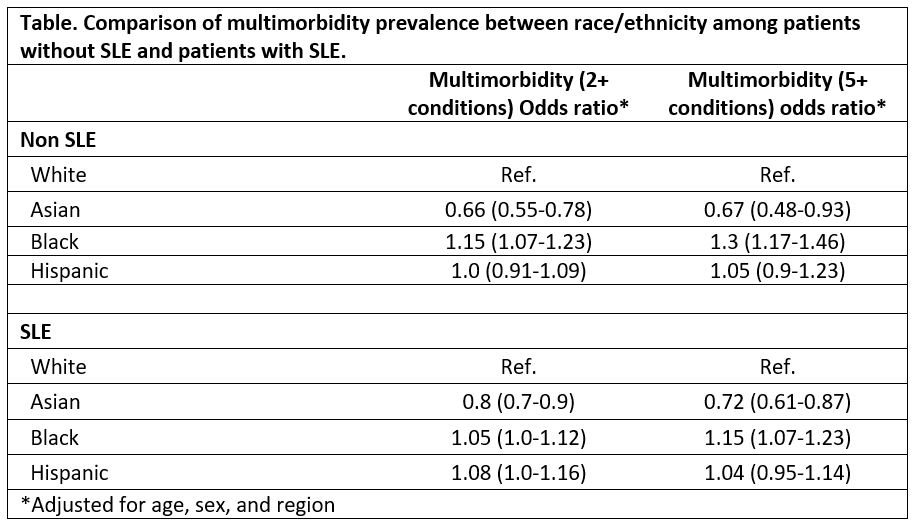Session Information
Date: Saturday, November 6, 2021
Title: Abstracts: Healthcare Disparities in Rheumatology (0492–0495)
Session Type: Abstract Session
Session Time: 4:15PM-4:30PM
Background/Purpose: Patients with systemic lupus erythematosus (SLE) have an increased burden of multimorbidity. Racial/ethnic disparities have also been associated with an increased burden of multimorbidity. We aimed to compare racial/ethnic difference in multimorbidity between patients with SLE and non-SLE comparators.
Methods: We used the OptumLabs Data Warehouse (OLDW), a longitudinal, real-world data asset with de-identified administrative claims for commercial and Medicare Advantage enrollees, to identify cases of SLE and matched comparators. Cases were defined as patients with ≥3 diagnoses of SLE between January 2006 and September 2015. Controls were persons without SLE matched 1:1 to SLE cases on age, sex, race/ethnicity, and enrollment date. Race was classified as non-Hispanic White (White), non-Hispanic Black (Black), non-Hispanic Asian (Asian), Hispanic, based on derived rule sets. Multimorbidity (2 or more comorbidities) was defined using 172 chronic comorbidities from the chronic condition indicator of the clinical classification software (healthcare cost and utilization project). SLE, cutaneous lupus, and rheumatoid arthritis ICD-9 codes were excluded from the analysis. Two or more ICD-9 codes at least 30 days apart were used to define a comorbidity. A secondary analysis was performed including those with 5 or more comorbidities (substantial multimorbidity). Logistic regression models were used to estimate odds ratios (OR) with 95% confidence intervals (CI) adjusted for age, sex, and region.
Results: The study included 34,869 cases with SLE and 34,869 matched non-SLE comparators. The mean age was 48 (SD 14.2) years, and 90.6% were female for both cohorts. 66.4% of the patients in both cohorts were White, 18.4% Black, 3.4% Asian and 18.4% Hispanic. Patients with SLE had more multimorbidity than non-SLE subjects (58.1% vs 26.3%). Among the non-SLE patients 26.7% of Whites experienced multimorbidity, compared to 16% of Asians, 22.6% of Hispanics, and 29.2% of Blacks. After adjustment for age, sex and geographic region, Blacks had higher multimorbidity (OR 1.15; 95%CI 1.07-1.23), Asians had lower multimorbidity (OR 0.66; 95%CI 0.55-0.78) while Hispanics (OR 1.0; 95%CI 0.91-1.09) had no difference in multimorbidity compared to Whites. Among the SLE patients, 58.6% of Whites experienced multimorbidity, compared to 47.2% of Asians, 56.0% of Hispanics, and 59.5% of Blacks. Adjusted analyses showed less pronounced decrease in multimorbidity for Asians (OR: 0.80; 95%CI: 0.70-0.90) and a less pronounced increase in Blacks (OR: 1.05; 95%CI: 0.99-1.12) and a similar increase in multimorbidity among Hispanics (OR: 1.07; 95%CI: 1.00-1.15) compared to Whites in the SLE cohort. Similar findings were observed in secondary analysis of those with 5 or more comorbidities (Table)
Conclusion: This large nationwide study showed increased occurrence of multimorbidity in SLE versus non-SLE patients across racial/ethnic groups. Racial/ethnic disparities in multimorbidity were more pronounced among patients without SLE compared to SLE patients. These findings suggest that the effects of race/ethnicity and SLE are not cumulative.
To cite this abstract in AMA style:
Duarte-Garcia A, Heien H, Shah N, Crowson C. Racial/Ethnic Differences in Multimorbidity Between Patients with Systemic Lupus Erythematosus and Comparators in a Large Nationwide US Study [abstract]. Arthritis Rheumatol. 2021; 73 (suppl 9). https://acrabstracts.org/abstract/racial-ethnic-differences-in-multimorbidity-between-patients-with-systemic-lupus-erythematosus-and-comparators-in-a-large-nationwide-us-study/. Accessed .« Back to ACR Convergence 2021
ACR Meeting Abstracts - https://acrabstracts.org/abstract/racial-ethnic-differences-in-multimorbidity-between-patients-with-systemic-lupus-erythematosus-and-comparators-in-a-large-nationwide-us-study/

